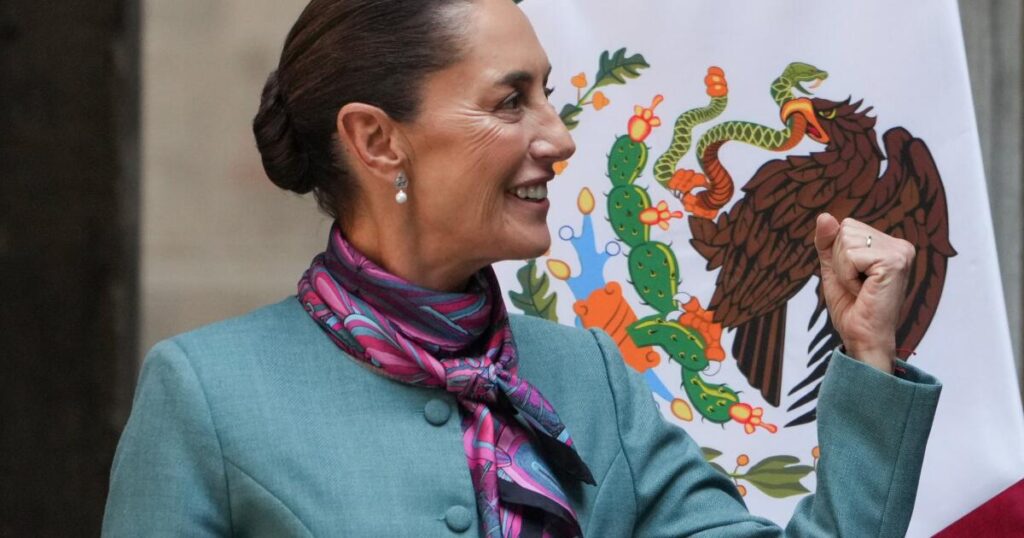Mexican President Claudia Sheinbaum said Monday that her country has avoided U.S. tariffs — for now — after coming to an agreement with President Trump.
Sheinbaum, in a post on X, said she spoke to the American leader Monday morning and that they came to an accord that delays for at least a month Trump’s threat of 25% tariffs on all Mexican goods imported to the U.S.
In exchange, she said Mexico had agreed to reinforce its northern border with 10,000 members of the National Guard in order to combat migration and the trafficking of illegal drugs.
Over the weekend, President Trump announced that heavy tariffs on goods from Mexico, Canada and China would take effect Tuesday, raising the specter of a disruptive trade war that could damage the economies of all three nations and dramatically raise costs for U.S. consumers.
Trump signed executive orders placing duties of 25% on imported goods from Mexico and Canada, with a 10% rate on Canadian energy products. The tariffs would have violated a 2020 free trade pact that Trump himself signed and celebrated as “the fairest, most balanced and beneficial trade agreement we have ever signed into law.”
Trump also imposed a 10% tax on all imports from China.
Trump said the tariffs were necessary because the three countries haven’t done enough to stop the flow of undocumented immigrants and drugs into the United States. The White House insisted the tariffs will remain in place “until the crisis is alleviated.” Trump repeatedly said that “nothing” would stop him from imposing the tariffs.
Shortly after Trump’s tariff announcement on Saturday, the leaders of Mexico and Canada announced they would respond by slapping retaliatory taxes on U.S. goods. China also said it would “take corresponding countermeasures to firmly safeguard its rights and interests.”
In a speech, Canadian Prime Minister Justin Trudeau urged his citizens not to buy American-made products and announced two waves of tariffs against the U.S. He questioned Trump’s claims that Canada is to blame for high levels of immigration or America’s fentanyl crisis. “Less than 1% of fentanyl and less than 1% of illegal crossings into the United States come from Canada,” Trudeau said.
In an overview of the tariffs on Mexico, a document released by the White House said “Mexican drug trafficking organizations have an intolerable alliance with the government of Mexico.”
Sheinbaum has struck back at that claim, highlighting in a post on X over the weekend Mexico’s gains in the fight against drug traffickers. She said that since she took office four months ago, Mexico has seized more than 40 tons of drugs, including 20 million doses of fentanyl, and has arrested more than ten thousand people linked to organized crime.
She criticized the U.S. for its high levels of drug consumption, urging Trump to do more to combat drug sales, and linked Mexico’s violence to the thousands of firearms smuggling south from the United States each year.
Sheinbaum vowed Mexico would also retaliate with tariffs on products imported from the U.S., adding: “Problems are not resolved by imposing tariffs, but by talking and engaging in dialogue.”
Mexico is the 13th largest economy in the world and is the second largest in Latin America.
But no country stands to lose more than Mexico in a trade war with the United States.
The U.S. and Mexico trade over $800 billion annually in goods, and the U.S. is the destination of nearly 83% of Mexico’s exports.
Tariffs could devastate Mexico’s already shaky economy, experts say, tipping it into recession. The Mexican peso tumbled to its lowest point against the dollar in nearly three years amid concerns over the tariffs.
“Mexico’s economy is entering uncharted territory as tensions escalate with its largest trading partner,” said Matteo Ceurvels, an analyst at Emarketer, a market research company. For Sheinbaum, he said, “Managing this economic rift will be one of the biggest tests of her presidency.”
Experts have warned that destabilizing Mexico’s economy could lead to an increase in organized crime there and cause a wave of migration to the U.S., the two phenomenons Trump insists he is trying to combat.
“If Mexico goes into a recession, you’ll see a surge in immigration,” said Joseph Brusuelas, chief economist at the accounting firm RSM US.
Trump had been warning for months that he planned to impose tariffs on imports in a bid to lure manufacturing back to the United States. But he also sees tariffs also as a negotiating tactic to extract compromises from other nations on matters that have little to do with trade.
Linthicum reported from Albuquerque. Cecilia Sánchez Vidal in the Times’ Mexico City bureau and staff writer Don Lee in Washington contributed to this report.

